The scars are there--not metaphorical or emotional ones, though these must be there, too--but physical scars, rough gashes long ago sealed over the ragged furrows that poured out a young man's blood onto the hot Alabama asphalt 45 years ago this March.
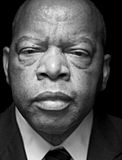
What can blood say? Does it speak? Does it whisper?
Is this what you want, America, my blood, my flesh, the rest of me? I will give it all to you, including my spirit, I will wear my soul out if that will help to heal you, and when there is no more of me, I will bequeath even my bones to your land.
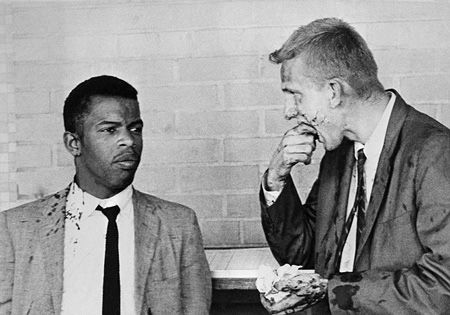
He had come to Selma, Alabama, this young man, on what seemed to him to be a necessary path. As the Chairman of the Student Non-violent Coordinating Committee (SNCC) this 25 year-old student of religion and philosophy had already endured beatings, arrest, insult, and ridicule beyond what most people endure in a lifetime.
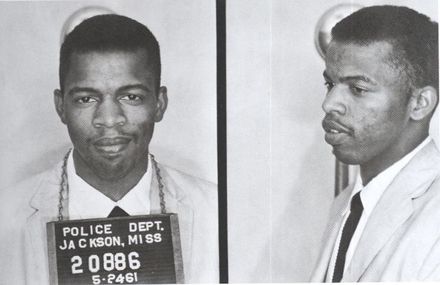
At age 19 he had helped organize the first lunch counter sit-in, in 1961 he was involved in the Freedom Rides to exercise the right—confirmed in a Supreme Court Decision (Boynton v. Virginia of 1960), that affirmed the illegality of racial segregation in public transportation, and in 1963 he had spoken at the March on Washington.
Even at this young age he had handled the brutality and violence with the same response that he would later give throughout his life: with prayer, nonviolence, and words of reconciliation and hope.
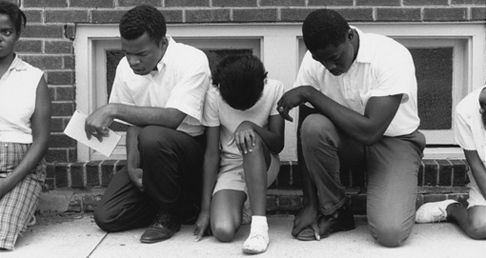
He was in Selma on the invitation of Amelia Boynton, who had contacted the Southern Christian Leadership Council (SCLC) and SNCC after being thwarted for years by local law enforcement in her attempt to register Black voters.
A young Vietnam veteran had recently been killed by Alabama state troopers, and there would now be a march to the state capital to ask Governor George Wallace to protect Blacks’ voting rights.
On March 9, the marchers left their gathering place at Brown Chapel, and crossed the Edmund Pettus Bridge over the Alabama river.
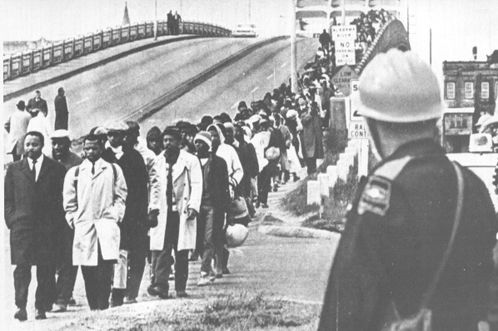
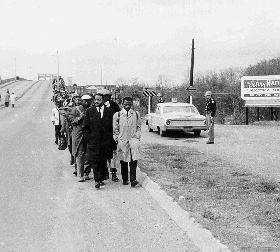
They were met by state troopers, dispatched by Governor Wallace to stop them.

Here, they were ordered to turn back, but did not.
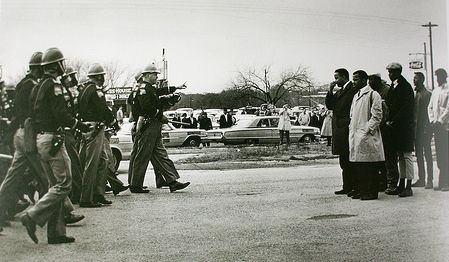
The troopers struck them down. Refusal to resist did not spare John Lewis, who was struck on the head by police batons, knocked to the ground, and beaten.
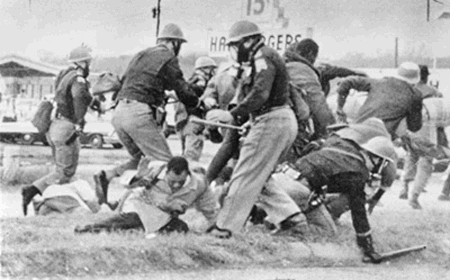
The second wave of troopers came with gas.
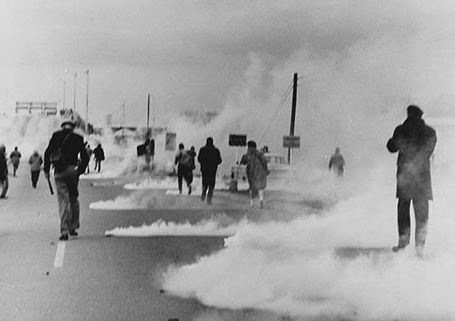
They swung their nightsticks in the haze and tumult.
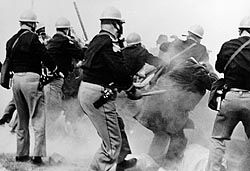
Amelia Boynton’s stricken image, nearly dying from the gas, was to become nationally famous.
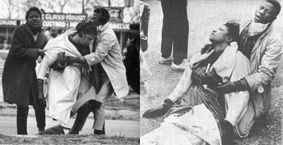
Among other injuries, John Lewis suffered a fractured skull.
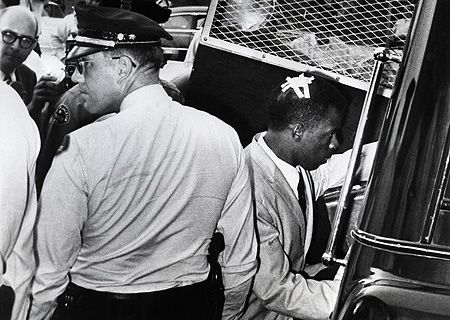
Two weeks later, after a court order and federal invervention in the form of protection by the Army, the Alabama National Guard, Federal Marshals, and the FBI, the march finally left Selma on March 21, and reached Montgomery on March 25, 45 years ago today.
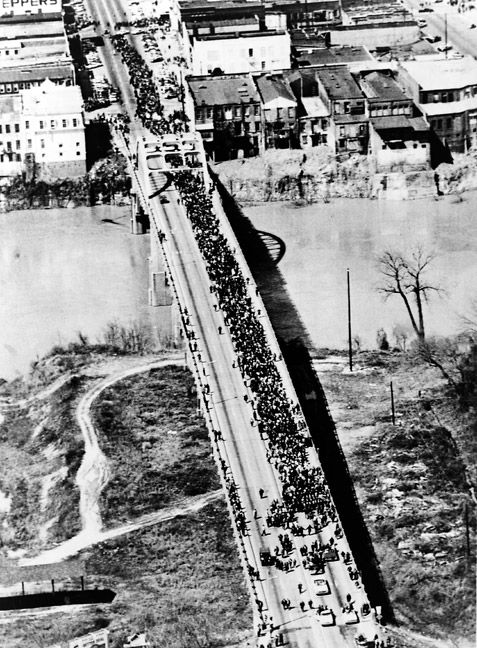
Forty-five years later, on an exact anniversary of the march, Congressman Lewis had to endure taunts whose echoes should have died generations ago, should never even have existed.
There are people who hate in this world. Enraged people who mean real harm. People who speak to us from their cars’ bumpers, telling us that freedom is not free, as if they had anything to teach us on this point.
For hundreds of years nothing mattered but our skin color, now we are told to shut up about our skin color. But we will not. They won't let us. They make it imperative for us to speak.
When a government official can not even walk to the very place where he has been sent by the will of the people to do their work, when his colleagues can not perform their Constitutional and elected duty to pass laws for this nation without threats and intimidation, we will speak, we must speak.
Just as John Lewis continues to this day:
As one who was a victim of violence and hate during the height of the Civil Rights Movement, I am deeply disturbed by the negative tone of the McCain-Palin campaign. What I am seeing today reminds me too much of another destructive period in American history. Sen. McCain and Gov. Palin are sowing the seeds of hatred and division, and there is no need for this hostility in our political discourse.
During another period, in the not too distant past, there was a governor of the state of Alabama named George Wallace who also became a presidential candidate. George Wallace never threw a bomb. He never fired a gun, but he created the climate and the conditions that encouraged vicious attacks against innocent Americans who only desired to exercise their constitutional rights. Because of this atmosphere of hate, four little girls were killed one Sunday morning when a church was bombed in Birmingham, Alabama.
As public figures with the power to influence and persuade, Sen. McCain and Governor Palin are playing with fire, and if they are not careful, that fire will consume us all.
That same fire was touching our nation when John Lewis was a young man in the South, one of a group of ordinary citizens who faced angry mobs, armed representatives of power, people who organized at night and came to drag families from their homes.
These were people with long pedigrees of hate, who gathered, as their fathers and grandfathers had, with ropes and crosses at dusk, culled the streets for men and boys who were the wrong skin color, and watched that strange fruit swing among the blossoms on magnolia trees with eyes that glinted from their bonfires. Who can walk among such gazes, even in the white blaze of the midday Alabama sun?
It is not that he was fearless, it is that some things must be done no matter how much fear is in your heart. "I thought I was going to die," Congressman Lewis said about his experience on the bridge. Yet he kept marching and speaking, as did other courageous men and women who were not deterred by violence.
The courage exhibited by men and women like John Lewis leads in a direct line to Barack Obama's presidency, which made that presidency possible, just as there is a parallel and direct line that runs from the hate, bigotry, and rage that Congressman Lewis faced to the same reaction to our current president.
Now that rage is boiling over, incited by erstwhile representatives of an opposition putatively loyal to our country and Constitution, publicly proclaiming to hold the best interests of all Americans at heart, while expressing anger at their own political impotence using an extreme and violent political language.
A few short years ago, the Republican Senate Majority Leader lost his position and any moral standing he might have had by a bigoted expression of regret that a segregationist did not become President.
More recently, because President Obama has endured extreme racist attacks since the beginning of his candidacy, we have become so inured to this bigotry as a society hat Newt Gingrich is able to state without much censure that the Civil Rights Act of 1964 was a mistake.
Politically aggrieved people like Mr. Gingrich use a supposed post-racial America as cover to spout their veiled or overt racism, while still claiming that non-Whites can not stop talking about race.
But the incensed masses and their inciters have gone beyond race now, to put figurative and literal target marks on any person who has the temerity to oppose their hateful ideology and politics. The worst crime is to prove them wrong by being politically successful in a nation that these people want everyone to believe holds center-right ideals.
But I will tell you this, Gingrich, Palin, Bachmann, Peter King, Buchanan, Beck, Limbaugh, Coulter, and the entire pack of your raving, deluded, verbal napalmers: You are both right and wrong about change in America.
Because even in your febrile distortions of what America has become, you don't quite yet know what you are up against. We are not inspired by myth, but by history, we are not moved by legends, but by truth. Our heroes do not come to us as packaged, marketed celluloid embodiments of armed, muscled machismo to rain down hell, vengeance and retribution in a high-caliber wish fulfillment of your projected grievances.
It is the ordinary person, armed with nothing more than the courage of her convictions facing entire angry mobs bristling with curses, insults and their hideous nightsticks, whom we honor and from whom we take inspiration.
Your fathers brought their firehoses, they brought their dogs, they brought the entire weight of laws that they had created to build virtual walls around an entire population in their midst. It was not enough. Your fathers lost to the principles we hold dear; you will too.


